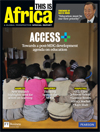Microsoft puts $75m behind new strategy for Africa

The world's biggest software maker launches a new initiative aimed to build skills and enterprise, positioning it to benefit from new internet users in Africa
Microsoft, the world’s largest software maker, has launched a new strategy to expand internet access in Africa, positioning it to grow its business on the continent.
Under the ‘4Afrika’ initiative the company will invest $75m over the next three years in broadband infrastructure, bringing 1m small and medium enterprises online, educating members of the workforce and graduates, and launching new smart-devices in Africa, Fernando de Sousa, general manager for Microsoft Africa, tells This is Africa.
Low-cost smart devices
As part of a strategy to focus on the smart-device market, the American multinational is rolling out a low-cost Windows Phone 8 smartphone set to compete with a growing portfolio of offerings from groups including BlackBerry and Samsung. The device is made by Chinese manufacturer Huawei, and targets students and first-time users with a price tag of $150.
The phone - which will be available across eight African countries including Egypt, Nigeria, Côte d’Ivoire, Angola and Kenya in February - has been designed specifically for African markets, with features including swappable batteries to allow users without access to electricity to remove the components for charging.
“Our device strategy for Africa focuses on relevance of the device, their applications and affordability,” Mr de Sousa says. “We are pre-loading the phone with market-related applications which we have built in Africa. In East Africa we have focused on creating mobile payment systems, where as in West Africa we have focused more on entertainment apps, because that is what Nigeria has more of a calling for.”
Huawei’s $100 Ideos phone fast became a best seller when it was launched in Kenya in 2011, bringing internet to thousands of first-time users. Microsoft is hoping for similar success with its Windows Phone 8. “We do expect it to be a game changer in terms of market share,” Mr de Sousa argues, without disclosing figures.
Mobile Infrastructure
Two decades after it started operations in Africa, Microsoft is also taking its first foray into mobile infrastructure development on the continent, launching low-cost wireless broadband in Kenya’s Rift Valley. In partnership with the Kenyan Ministry of Information and Communications and a Kenyan internet service provider Indigo Telecom, Microsoft hopes bring internet to 6,000 new users.
The pilot project will deploy solar-powered base stations and use ‘White Spaces’ – unused portions of spectrum adjacent to existing television transmissions – to roll out internet in areas of central Kenya without access to the national grid. “We have employed this White Spaces technology in the US, so we have it working, and we have built the software used within the White Spaces technology, so we have a very technically-oriented role here,” Mr de Sousa explains. Microsoft will also be providing software applications, including Office 365 and Windows, to new users.
“This is a very contained 12 month pilot, but there are other projects that we want to roll out in east, west and southern Africa. We are working with regulatory authorities in each country to develop regulations to allow the technology to be deployed. But the objective is to get very significant parts of the continent connected through this technology,” Mr de Sousa says.
“Africa by Africans for Africa”
Like its rival Google, Microsoft is also looking to bring small and medium businesses online through a new hub offering free domain registration, and the group hopes to get 1m SMEs registered under the 4Afrika initiative.
“There is a lot of innovation and progress happening in Africa but the world hasn’t heard about it, and Africa isn’t seen to be a continent that is playing competitively around the globe. We believe that a lot of it has to do with access,” Mr de Sousa argues. “We are moving away from domain registration and email, which is a standard service, but want to use that as a platform for entrepreneurs to create that content: African applications or services built by Africans for the benefit of Africa.”
Microsoft will also educate 100,000 members of the existing workforce, and an additional 100,000 students in relevant skills to enhance employability, entrepreneurship and job creation – all with the aim of developing economies, building the ICT ecosystem, and populating the web with African content.
As new undersea data cables and skyrocketing mobile phone subscriptions – now in excess of 500m – reshape Africa’s connectivity, groups including Google, Research in Motion, Samsung, have all been developing relevant local content in an effort to deepen their footprint on the continent.
“It appears that Microsoft has been looking pretty closely at what Google has been doing on the continent and has come up with a similar strategy – in terms of projects to fill missing parts of the internet infrastructure, and in terms of bringing lower-cost data-enabled devices into the market to encourage the uptake of internet,” says Matthew Reed, principal analyst with Informa Telecoms & Media.
“Africa is the last great frontier for growth in internet and internet related services and that’s why these big players with interest in the internet are interested and are finding ways to encourage growth in internet use, and along the way to position themselves and their services advantageously,” he explains.
Microsoft expects that by bringing more Africans online, it will generate a generation of new users: “By using technology to drive efficiency, competitiveness, quality of output and services, the market itself grows - so there is an opportunity for Microsoft to compete for incremental products and services,” Mr de Sousa says.
“This is not philanthropy, we are listening to Africa and Africa is saying trade not aid, and that is what we are doing.”
Access+
|
| Access+: A focus on education in Africa This Is Africa takes an in-depth look at the state of education in Africa Visit our Access+ page for: |
|
This is Africa is now on Twitter!
Most Viewed Content
-
6 recommendations
-
3 recommendations
-
2 recommendations
-
1 recommendations
-
1 recommendations




